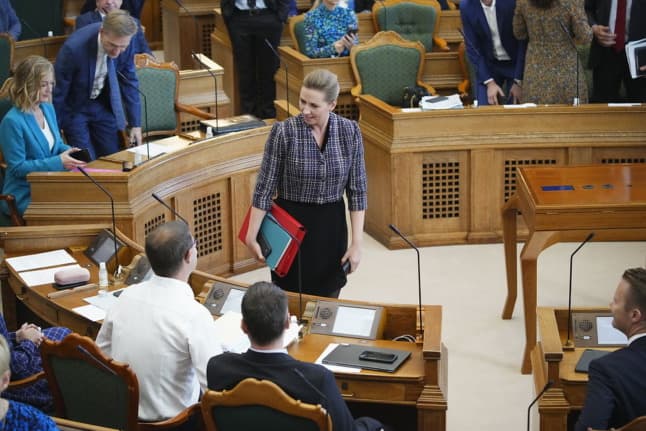Today in Denmark: A roundup of the news on Thursday

Find out what's going on in Denmark today with The Local's short roundup of the news in less than five minutes.
Evacuated women and children from Syria arrive in Denmark
Fourteen children and their three Danish mothers have arrived in Denmark after being repatriated by the government from a detention camp for former Isis militants and sympathisers in Syria.
The women and children, who have been waiting for months to leave the camps after the government agreed to repatriate them earlier this year, are now in Denmark after leaving the al-Roj camp yesterday, broadcaster DR reports.
According to DR, which previously reported that the three mothers were secretly charged by the government on terrorism laws during the summer, the women are now in police custody and are expected to appear for preliminary hearings today.
First debate in parliament
The first debate of the new political session takes place today, after the traditional reopening of parliament earlier in the week.
Each party will be given the opportunity to speak during the debate. Individual lawmakers can then request time to speak before Prime Minister Mette Frederiksen is given the opportunity to take the platform.
The opening debate often stretches out well into the evening.
Mink commission to begin hearings
An official inquiry into her government’s decision to cull all farmed mink in Denmark, officially named granskningskommissionen, begins today.
The mink inquiry is related to the government’s decision last November to cull millions of minks at breeding farms across the country, after a concerning variant of Covid-19 was discovered in the animals.
Prime Minister Mette Frederiksen is scheduled to speak to the commission in December.
The inquiry differs from the established form of investigation, termed undersøgelseskommision in that it is further-reaching – for example, by being able to summon witnesses for interview, rather than relying on legal reports or written accounts.
READ ALSO: Danish PM Frederiksen to be questioned over Covid-19 mink culls
New labour agreement could make it (slightly) easier for foreign workers to find a job in Denmark
Proposed new rules affecting employment were announced yesterday following an agreement between the government and labour organisations.
The agreement, which focuses on several areas of the labour market, aims to ease the lack of labour currently prevalent in the country, in part by assisting companies in employing workers from other parts of Europe and taking measures to smooth the way into jobs for international students.
But the proposed new rules, which would have to be passed by parliament, have been called “limited” by critics who are concerned they do not go far enough to resolve Denmark’s labour shortage.
Comments
See Also
Evacuated women and children from Syria arrive in Denmark
Fourteen children and their three Danish mothers have arrived in Denmark after being repatriated by the government from a detention camp for former Isis militants and sympathisers in Syria.
The women and children, who have been waiting for months to leave the camps after the government agreed to repatriate them earlier this year, are now in Denmark after leaving the al-Roj camp yesterday, broadcaster DR reports.
According to DR, which previously reported that the three mothers were secretly charged by the government on terrorism laws during the summer, the women are now in police custody and are expected to appear for preliminary hearings today.
First debate in parliament
The first debate of the new political session takes place today, after the traditional reopening of parliament earlier in the week.
Each party will be given the opportunity to speak during the debate. Individual lawmakers can then request time to speak before Prime Minister Mette Frederiksen is given the opportunity to take the platform.
The opening debate often stretches out well into the evening.
Mink commission to begin hearings
An official inquiry into her government’s decision to cull all farmed mink in Denmark, officially named granskningskommissionen, begins today.
The mink inquiry is related to the government’s decision last November to cull millions of minks at breeding farms across the country, after a concerning variant of Covid-19 was discovered in the animals.
Prime Minister Mette Frederiksen is scheduled to speak to the commission in December.
The inquiry differs from the established form of investigation, termed undersøgelseskommision in that it is further-reaching – for example, by being able to summon witnesses for interview, rather than relying on legal reports or written accounts.
READ ALSO: Danish PM Frederiksen to be questioned over Covid-19 mink culls
New labour agreement could make it (slightly) easier for foreign workers to find a job in Denmark
Proposed new rules affecting employment were announced yesterday following an agreement between the government and labour organisations.
The agreement, which focuses on several areas of the labour market, aims to ease the lack of labour currently prevalent in the country, in part by assisting companies in employing workers from other parts of Europe and taking measures to smooth the way into jobs for international students.
But the proposed new rules, which would have to be passed by parliament, have been called “limited” by critics who are concerned they do not go far enough to resolve Denmark’s labour shortage.
Join the conversation in our comments section below. Share your own views and experience and if you have a question or suggestion for our journalists then email us at [email protected].
Please keep comments civil, constructive and on topic – and make sure to read our terms of use before getting involved.
Please log in here to leave a comment.